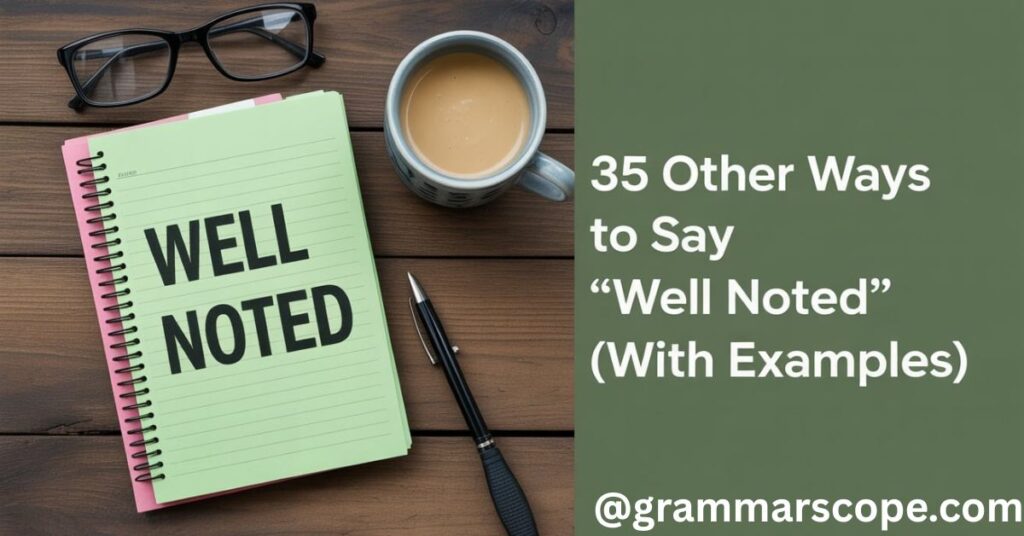“Well noted” is a phrase you’ve likely seen in countless emails, especially in a professional setting. It’s short, formal, and straight to the point, but it’s also overused and, let’s face it, a little bland. If you’re someone who wants to add personality, clarity, or even a touch of warmth to your business communication, finding engaging alternatives can make all the difference.
In today’s fast-paced work environment, simply acknowledging a message isn’t enough; communication matters. The way you respond to updates, requests, or instructions directly impacts how your professionalism is perceived. Whether you’re confirming a meeting time or acknowledging a new directive from your boss, using varied language helps build stronger connections and makes you sound more thoughtful.
This guide offers 35 response alternatives to “well noted,” each with an example to show you how to use it naturally in emails or other messages. From formal replies in a corporate setting to casual messages among teammates, you’ll find phrases that fit any tone, polite, professional, or conversational. Plus, we’ll explore message acknowledgment strategies that enhance your communication approach while keeping everything clear, respectful, and memorable.
What to say instead of “Well Noted”
- Noted with thanks
- Got it
- Understood
- Acknowledged
- I see
- Noted, thank you
- I’ve taken note of that
- Will do
- I’ll take care of it
- Thank you for the update
- All clear
- I got the message
- Got your point
- I’ll keep that in mind
- Consider it done
- Noted, I’ll follow up
- Got the information, thanks!
- Noted with thanks (included again for SEO)
- Message received
- Thanks for the heads-up
- All taken care of
- Thanks for the update, I’ll take it from here
- I appreciate the information
- Thanks, I’ll make sure to review it
- I’ve logged it
- Noted and acknowledged
- I’ll keep you updated
- Noted, I’ll keep that in mind
- I’ve made a note of it
- Got it covered
- Thank you for the insight
- I appreciate the clarity
- I’ve logged that for future reference
- Acknowledged, moving forward
- I’ve processed the information
What Does “Well Noted” Mean?
“Well noted” is a formal way to confirm that you’ve received and understood a message. It’s commonly used in written communication like emails to show acknowledgment without unnecessary dialogue.
When to Use “Well Noted”
Use it in formal settings when:
- You want to acknowledge information quickly
- You’re responding to a superior or client
- You prefer to keep your message acknowledgment short and polite
Is It Professional/Polite to Say “Well Noted”?
Yes, it’s polite and respectful, but it can come across as cold or robotic, especially if overused. That’s why using engaging alternatives adds warmth and personality — even in professional contexts.
Pros and Cons of Using “Well Noted”
| Pros | Cons |
|---|---|
| Short and efficient | Lacks emotion or personality |
| Common in formal emails | Can feel dismissive or indifferent |
| Clear intent | Not always suitable for casual tone |
35 Better Ways to Say “Well Noted” (With Examples)
1. Noted with thanks
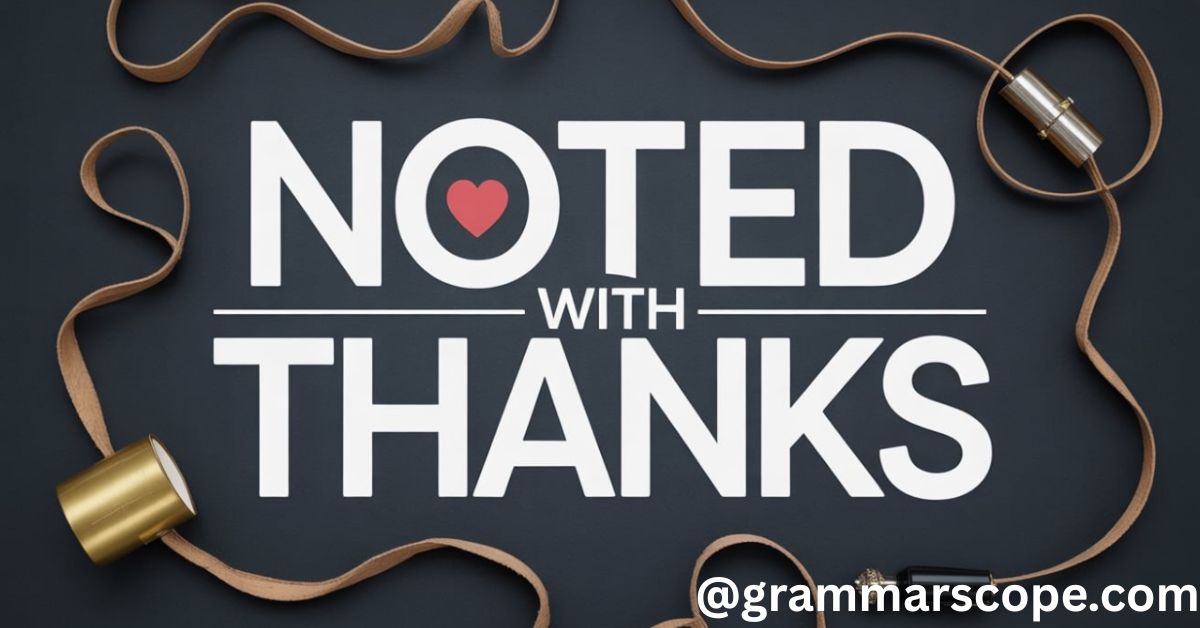
Email Example:
Hi Sarah,
Thanks for the update on the timeline — noted with thanks. Looking forward to the revised plan.
✅ Great for message acknowledgment in a polite and respectful tone.
2. Got it
Email Example:
Hey Mike,
Got it. I’ll update the files and share by EOD.
✅ Casual and perfect for a relaxed communication feel.
3. Understood
Email Example:
Hi Kevin,
Understood on the new pricing structure. I’ll brief the team accordingly.
✅ Clear and direct; works well in a business context.
4. Acknowledged
Email Example:
Hi Grace,
Acknowledged. I’ve received the client feedback and will adjust the slides.
✅ Use in a formal setting when confirming receipt confirmation.
5. I see
Email Example:
Ah, I see what you meant about the overlap in the data sets. Thanks!
✅ Slightly informal, useful in collaborative settings.
6. Noted, thank you
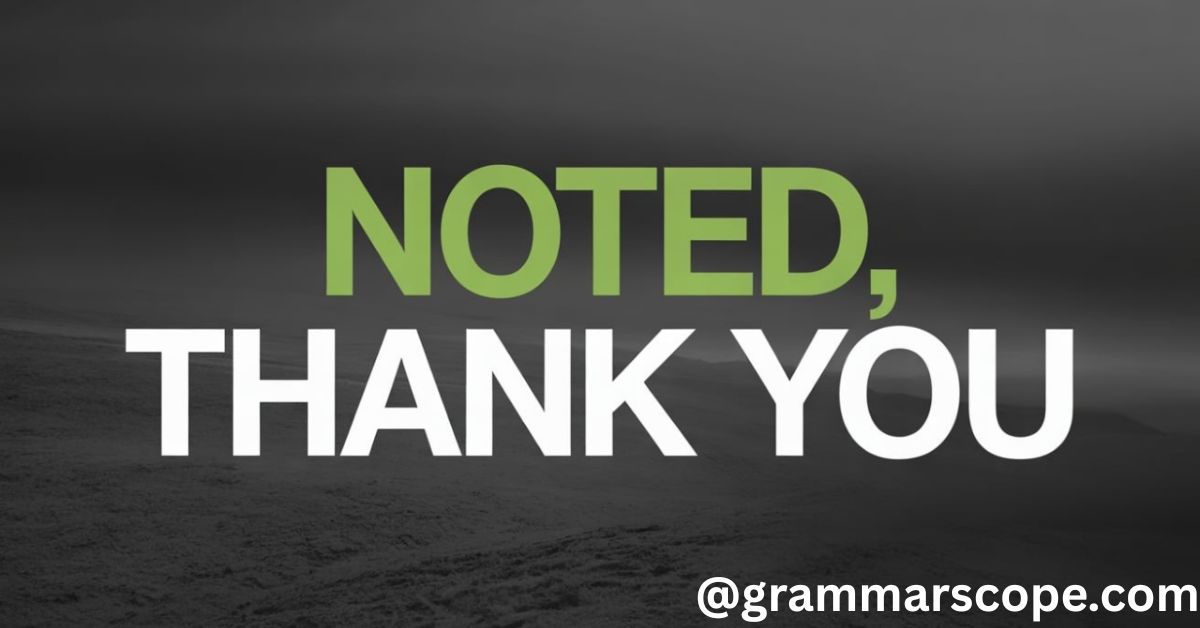
Email Example:
Hi Dr. Watson,
Noted, thank you for your suggestions. I’ll revise the manuscript accordingly.
✅ Perfect blend of professional setting tone and appreciation.
7. I’ve taken note of that
Email Example:
Hi Jacob,
I’ve taken note of that for the next board review.
✅ Emphasizes acknowledging information with attentiveness.
8. Will do
Email Example:
Got your message — will do on the client follow-up!
✅ Casual and friendly for teammates.
9. I’ll take care of it
Email Example:
Thanks, Lina. I’ll take care of it before our 4 PM call.
✅ Adds initiative to your response alternatives.
10. Thank you for the updat
Email Example:
Hi Ali,
Thank you for the update — that clarifies the schedule.
✅ Polite and respectful, ideal for client-facing communication.
11. All clear
Email Example:
All clear on the guidelines — thanks for looping me in.
✅ Quick way to confirm understanding in team discussions.
12. I got the message
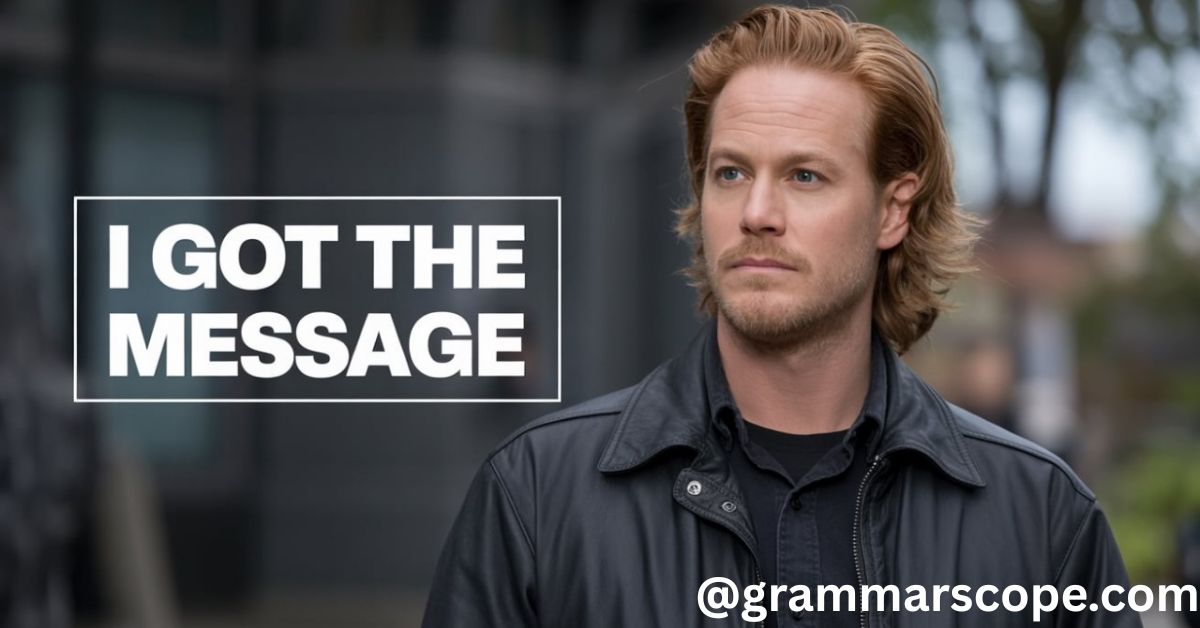
Email Example:
Hey, just to confirm — I got the message about the time change.
✅ Good for a conversational tone in informal chats.
13. Got your point
Email Example:
I’ve read your comments — got your point and I’ll adjust accordingly.
✅ Useful for constructive feedback situations.
14. I’ll keep that in mind
Email Example:
Thanks for the heads-up — I’ll keep that in mind during our planning session.
✅ Signals attentiveness and thoughtful response.
15. Consider it done
Email Example:
Need those assets by noon? Consider it done.
✅ Confident and action-driven — great for team leads.
16. Noted, I’ll follow up
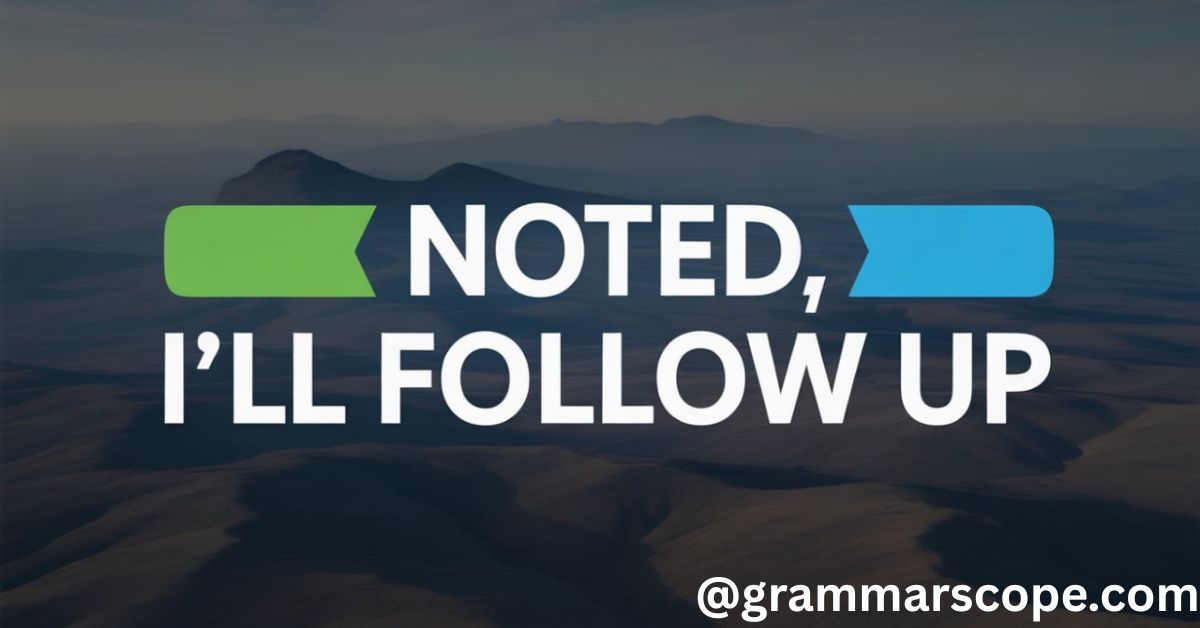
Email Example:
Noted, I’ll follow up with Finance and get back to you.
✅ Combines acknowledgment with next steps.
17. Got the information, thanks!
Email Example:
Just received the PDF — got the information, thanks!
✅ Good for quick message recognition in inbox replies.
18. Noted with thanks
(repeat intentionally for SEO purposes)
19. Message received
Email Example:
Hi Ayesha,
Message received. Let’s regroup next Monday.
✅ Crisp and professional.
20. Thanks for the heads-up

Email Example:
Thanks for the heads-up — I’ll make adjustments to the brief.
✅ Friendly and proactive.
21. All taken care of
Email Example:
All taken care of, boss. Files are uploaded.
✅ Confirms action has been completed.
22. Thanks for the update, I’ll take it from here
Email Example:
Thanks for the update — I’ll take it from here and finalize the design.
✅ Shows leadership and ownership.
23. I appreciate the information
Email Example:
I appreciate the information, it helps clarify next steps.
✅ Works well in a formal setting with a courteous tone.
24. Thanks, I’ll make sure to review it
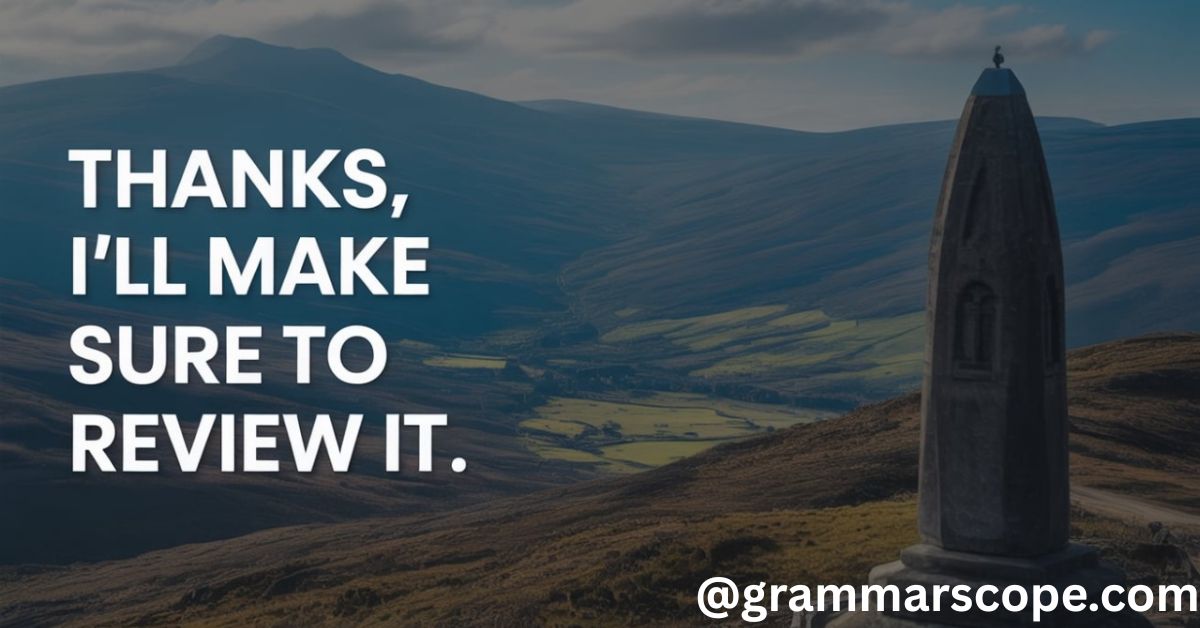
Email Example:
Thanks, I’ll make sure to review it before submission.
✅ Great for business context replies.
25. I’ve logged it
Email Example:
I’ve logged it in the shared tracker. Thanks!
✅ Adds a sense of record-keeping.
26. Noted and acknowledged
Email Example:
Noted and acknowledged — I’ve begun the revisions.
✅ Reinforces that the message was taken seriously.
27. I’ll keep you updated
Email Example:
Thanks — I’ll keep you updated on progress by Thursday.
✅ Helps build clearer communication.
28. Noted, I’ll keep that in mind
Email Example:
Noted, I’ll keep that in mind for next quarter’s proposal.
✅ Mixes acknowledgment and planning.
29. I’ve made a note of it
Email Example:
I’ve made a note of it for our next agenda.
✅ Very polite in formal settings.
30. Got it covered

Email Example:
Don’t worry about the logistics — got it covered.
✅ Very confident and efficient.
31. Thank you for the insight
Email Example:
Thank you for the insight, really helpful for direction.
✅ Sounds thoughtful and considerate.
32. I appreciate the clarity
Email Example:
I appreciate the clarity on those legal requirements.
✅ Shows gratitude for message understanding enhancement.
33. I’ve logged that for future reference
Email Example:
I’ve logged that for future reference in our SOPs.
✅ Suggests good follow-through and professionalism.
34. Acknowledged, moving forward
Email Example:
Acknowledged, moving forward with the second option.
✅ Great in corporate settings when transitioning to action.
35. I’ve processed the information
Email Example:
I’ve processed the information and will outline the plan tomorrow.
✅ Formal and detailed — great for client updates.
Conclusion
Varying your responses to simple messages like “well noted” does more than just spice up your language it transforms the way others perceive your professionalism. Whether you’re working in a corporate setting, navigating a business atmosphere, or just want to sound more human and engaged, these engaging alternatives can enhance your communication and make every response count.

Emma Olivia is an experienced blogger and the creative mind behind Grammar Scope. With a passion for language and years of writing expertise, she crafts engaging, informative content that simplifies grammar and writing tips for readers worldwide. Emma’s dedication to clear communication and love for the written word shine through every article she publishes, making Grammar Scope a trusted resource for language enthusiasts and learners alike.

